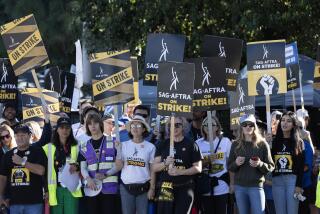How will this show end?
- Share via
As the Writers Guild of America strike enters a crucial stage, many thoughtful people around town are asking, “Does anyone really win a strike anymore?”
Some very emotional movies have been made about strikes, going back to “How Green Was My Valley,” so it’s perhaps inevitable that the folks who create our movies and TV shows are investing their own walkout with a lot of emotion. The demonstrations keep getting bigger, the rhetoric more flowery. No longer is this a mere dispute over prosaic issues such as residuals and digital downloads. To the Writers Guild’s chief organizer, David Young, it’s now “part of the bigger struggle of the middle class and the power concentration in this country.”
The upshot is that the guild and the entertainment companies are now at a crucial moment. The two sides today confront each other in an eleventh-hour summit. “Peace Pipe or Smoke Screen?” Variety asked in its headline about the talks set to resume today, suggesting that the meeting could be either a PR gesture or a serious effort to find a compromise. If the session proves unproductive, Hollywood will brace itself for a long and costly standoff.
A long strike would be exasperating for several reasons. Experienced observers agree that the differences between the writers and the studios are not that extreme -- that reasonable people could strike a compromise.
Further, this is hardly a classic labor versus management confrontation. A good number of the strikers -- the so-called showrunners, for example -- are easily as wealthy as the corporate apparatchiks they now confront. And the key decision-makers on the management side are liberal middle-class types whose parents, in many cases, were union members. The managers, like the showrunners, achieved their positions because they know how to manage people and fashion deals. It’s bizarre, therefore, to find them haranguing each other.
A visit to the picket lines suggests more a show than class warfare. There are spirited speeches, visits by cheerful celebrities, songs by the likes of Alicia Keys and good food. The rallies provide an opportunity for young wannabes who are struggling for credits to meet their superstar writing colleagues.
The wannabes especially worry whether the big companies will try to squeeze them out of their just returns from the Web. The guild has made its case forcefully on this issue, but management has not.
“The industry has already paid millions of dollars in residuals for permanent and pay-for-view downloads,” the companies have declared, but they have not offered a coherent formula to assure continued and expanded payments. The dilemma faced by the Time Warners and Disneys of the world is that they have to assure investors that their new media ventures will become hugely profitable even as they tell writers that they will not.
In view of all this, it’s reasonable to ask, why hasn’t an accommodation been reached? After all, this is all about numbers. No one is closing the coal mines or moving away the only factory in town.
Talk to the small group of professional arbiters -- those gurus who have helped resolve Hollywood’s major disputes over the years -- and you get a common answer: Both sides have displayed equal clumsiness and heavy-handedness that has left the community both baffled and divided.
As evidence, one need look no further than a new opinion survey of Variety subscribers by the Magid organization. Remember, the median income of a subscriber to Variety is more than $400,000 a year -- this is not exactly a predictably pro-labor constituency. The survey found that 44% of 999 subscribers polled think the strike will be resolved in the companies’ favor, versus 20% in the writers’ favor. Yet the survey also indicated that 54% believe the strike “was necessary at this time,” and a surprising 69% believe the writers have been “more honest and forthright” than the studios.
So the question remains: Will the posturing stop and the negotiating -- true negotiating -- finally begin? If reason does not prevail, the entire community will pay a heavy price.
More to Read
Only good movies
Get the Indie Focus newsletter, Mark Olsen's weekly guide to the world of cinema.
You may occasionally receive promotional content from the Los Angeles Times.









